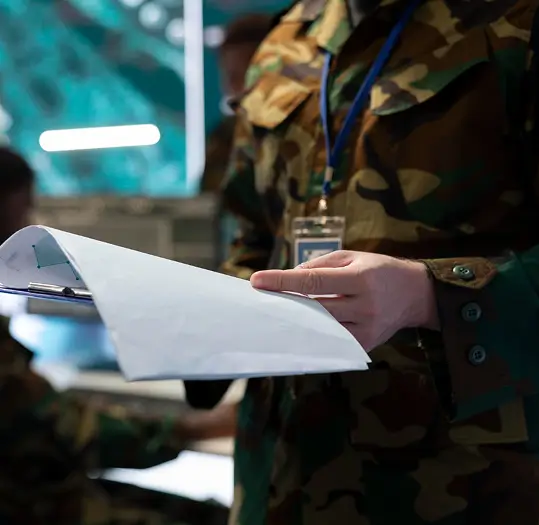Maryland’s national-security corridor—anchored by NSA, U.S. Cyber Command, DISA, and dozens of major primes—relies heavily on small businesses to support mission-critical functions. For veteran entrepreneurs entering this space, obtaining Veteran-Owned Business (VOB) or Service-Disabled Veteran-Owned Business (SDVOB) certification can open significant contracting opportunities and differentiate your company in a highly competitive environment.
Yet many new contractors misunderstand what these certifications are, how they work, and what they must do to keep them. This guide breaks down the essentials for businesses operating near NSA and Fort Meade.
1. What Are VOB and SDVOB Certifications?
Veteran-Owned Business (VOB)
A VOB is a small business that is at least 51% owned and controlled by one or more U.S. military veterans. “Control” means day-to-day management and long-term strategic control of the company.
Service-Disabled Veteran-Owned Business (SDVOB / SDVOSB)
An SDVOB/SDVOSB is a small business that meets the VOB requirements and is owned and controlled by a veteran with a service-connected disability rating from the VA.
Why These Matter Near NSA/Fort Meade
- NSA, DoD, and Intelligence Community missions frequently include set-aside requirements for SDVOB and other small business categories.
- Large primes must meet subcontracting goals and actively seek SDVOB partners.
- Past performance in veteran categories is heavily valued across DoD contracts.
In short: these certifications create opportunities not available to non-veteran firms.
2. How to Get VOB or SDVOB Certification
VOB and SDVOB certifications are Small Business Administration (SBA).
Eligibility Requirements
To qualify, the veteran must:
- Be 51% or more unconditional owner of the business
- Have full control of the company
- Have the highest officer position (e.g., CEO)
- Manage day-to-day operations
- For SDVOB: Have a VA service-connected disability rating
Required Documentation
Expect to submit:
- DD-214 (discharge record)
- VA disability letter (for SDVOB)
- Articles of Organization or Incorporation
- Operating Agreement or bylaws
- Stock certificates (if applicable)
- Organizational chart
- Resume demonstrating management control
- Bank signature cards
- Buy-Sell or succession documents
Important: The SBA thoroughly reviews whether the veteran truly controls the company—not just on paper, but in reality.
How to Apply
- Register at SBA’s Veteran Small Business Certification portal
- Upload required documents and answer eligibility questions
- Participate in an SBA interview or follow-up request, if issued
- Receive certification (typically 30–90 days)
For contractors near NSA, PLG often recommends pre-application reviews to avoid delays or denials.
3. What Is Required to Maintain Your VOB or SDVOB Status?
Once certified, businesses must maintain strict control and ownership in line with SBA rules.
Key Ongoing Requirements
- The veteran must remain the majority owner
- The veteran must continue to control management and decision-making
- Key documents (Operating Agreement, Buy-Sell, bylaws) must not shift control
- Any ownership changes must be reported to SBA
- Annual updates and recertification every 3 years
- Maintain good standing with Maryland SDAT
Danger Areas That Lead to Loss of Certification
- Non-veteran partners gaining disproportionate control
- Operating Agreements that restrict the veteran’s authority
- Unapproved Buy-Sell Agreements
- Spouses or investors obtaining control rights
- Veteran stepping down as CEO or President
- FOCI concerns if foreign investors become involved (critical near NSA)
Because NSA-related contractors often require stability for clearance purposes, a disruption to certification can also affect contracts, teaming agreements, and subcontractor eligibility.
4. Benefits of VOB and SDVOB Certification in the NSA/Fort Meade Region
Certification unlocks opportunities that are especially valuable in Maryland’s national-security corridor.
Federal Contracting Benefits
- Access to SDVOSB set-asides
- Ability to prime small contracts others cannot compete for
- Priority consideration under certain DoD and VA programs
- Leverage for entry into intelligence, cyber, and SIGINT mission work
- Increased visibility to contracting officers
Subcontracting Benefits with Meade-Area Primes
Large primes—Leidos, Booz Allen, SAIC, CACI, Peraton, Jacobs—must meet SDVOB goals. Certified companies gain preferred teaming opportunities and easier BD conversations.
Reputation & Trust Benefits
In a region driven by national security and service culture:
- Veteran-owned companies often benefit from stronger trust
- Military decision-makers value shared background
- Hiring pipelines and clearance pathways may be easier
- Community networking creates additional contract leads
Competitive Advantage
Certification is often the deciding factor between two similar small businesses bidding on subcontracting work.
5. Why Work With Patriots Law Group
As a law firm founded by former military JAG attorneys and deeply embedded in Maryland’s national-security ecosystem, PLG helps contractors:
- Determine whether they qualify for VOB/SDVOB
- Prepare compliant organizational documents
- Structure ownership and control for SBA approval
- Avoid pitfalls that lead to denials
- Maintain certification compliance
- Align corporate governance with clearance and national-security requirements
For companies near NSA or within the Fort Meade technology corridor, the stakes are higher: compliance affects not only your business structure but also your ability to work on sensitive contracts and maintain eligibility for future mission work.
Conclusion
VOB and SDVOB certifications offer Maryland government contractors a powerful competitive edge, particularly in the NSA/Fort Meade region where national-security missions depend heavily on small, specialized businesses. With the right structure, proper documentation, and ongoing compliance, veteran entrepreneurs can leverage these certifications to win set-asides, partner with major primes, and build a strong foothold in the federal contracting ecosystem.
Patriots Law Group is here to help you every step of the way—from formation to certification to long-term compliance.
Disclaimer
This blog post is for informational purposes only and does not constitute legal advice. Reading this article does not create an attorney–client relationship with Patriots Law Group. VOB/SDVOB certification decisions are fact-specific; consult a qualified attorney for guidance tailored to your business.

